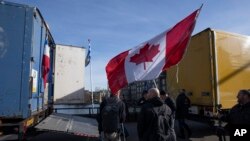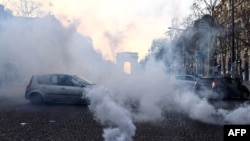Trucker-led protests against coronavirus vaccine mandates that began in the Canadian capital, Ottawa, and spread to the U.S.-Canadian border are leading to copycat protests in Europe and elsewhere in the world.
Canadian police began early Saturday to clear the protesters, who were blocking the Ambassador Bridge, a key connector between the two countries. Media reports said the standoff eased as police persuaded protesters to move their trucks. However, more protesters arrived, gathering a few blocks away and controlling the road to the bridge. As night neared, traffic had not resumed on the Ambassador Bridge.
"We appreciate the cooperation of the demonstrators at this time and we will continue to focus on resolving the demonstration peacefully. Avoid area!" Windsor police tweeted, adding that no one had been arrested.
Truckers demanding an end to Canada’s coronavirus restrictions started the “Freedom Convoy” protests that eventually blocked the bridge between the Midwestern U.S. city of Detroit and Windsor, Ontario, Canada, as well as other key passageways between the two countries. The closure disrupted the North American auto industry.
Police said they began to enforce the order after a judge granted an injunction to end the blockade on Friday, when the Canadian province of Ontario declared an emergency.
Demonstrations elsewhere
The protests have sparked “Freedom Convoy” demonstrations in France, Australia and New Zealand.
In Paris Saturday, Freedom Convoy protesters in vehicles snarled traffic around the Arc de Triomphe monument in defiance of an order not to enter the city to demonstrate. After managing to get past police checkpoints in central Paris, motorists were seen defiantly honking horns and waving flags. The police said they stopped 500 vehicles and issued 300 tickets.
Police used tear gas to break up a small crowd of protesters on the Champs Elysees.
New Zealand, Australia
Anti-vaccination rallies that have been held in recent days in New Zealand and Australia gained momentum Saturday as demonstrators blocked roads and disrupted life in their capitals.
Some 10,000 protesters converged on Canberra’s primary showgrounds, blocking roads and forcing the cancellation of a popular book fair. Police said three people were arrested but that the demonstrators were generally “well-behaved.”
In the New Zealand capital of Wellington, hundreds of protesters assembled on parliament grounds for a fifth day, despite heavy rain.
While the protests in New Zealand and Australia, both highly vaccinated countries, have been relatively small, they have occasionally turned violent.
As the crowd of protesters on the parliament grounds in Wellington grew larger despite downpours, some danced and shouted and one group performed a Maori haka, an indigenous ceremonial dance.
After days of failed efforts to disperse the protesters with tactics such as soaking them with sprinklers, Parliament Speaker Trevor Mallard resorted Saturday evening to using a sound system to drown out vaccine messages, blaring decades-old Barry Manilow songs and the 1990s earworm hit "Macarena" on a repeat loop.
Protesters responded by blasting their own songs, including Twister Sister's "We're Not Gonna Take It."
'Time to go home'
Canadian Prime Minister Justin Trudeau is being pressured by opposition party leaders to intervene in the protests, while U.S. President Joe Biden's administration urged Trudeau’s government to use federal powers.
Trudeau has informed Biden he will take quick action to end the protests. After a phone call with Biden on Friday, Trudeau said all options to end blockades are being considered, and added the consequences were becoming "more and more severe."
"We've heard your frustration with COVID, with the measures," Trudeau told reporters Friday while addressing the demonstrator’s concerns. "It's time to go home now."
Some information for this report came from Agence France-Presse, The Associated Press and Reuters.s of 2018.






